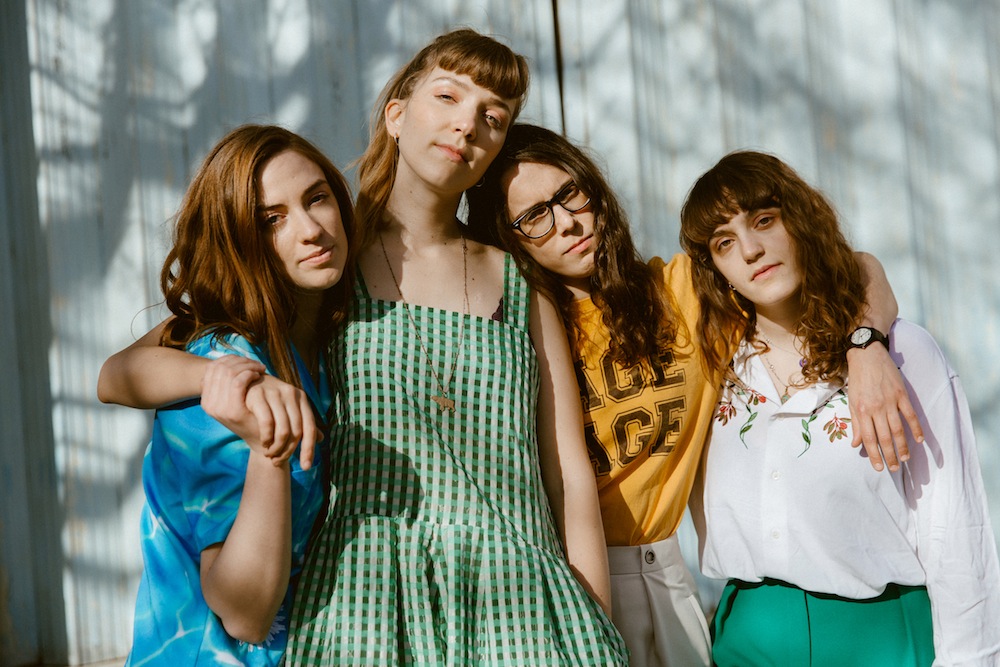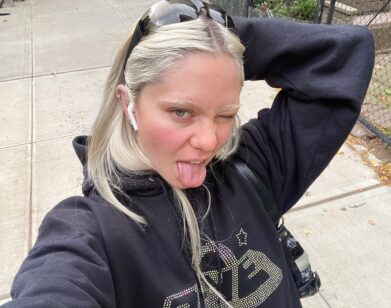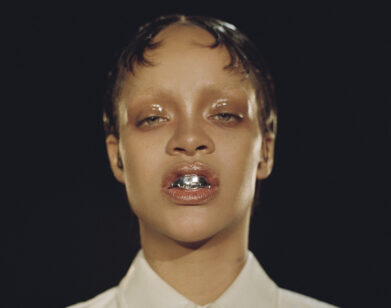The Big Moon
THE BIG MOON IN LONDON, MARCH 2017. PHOTOS: LAUREN MACCABEE. STYLING: NATHAN KLEIN. HAIR: ROM SARTIPI USING BUMBLE AND BUMBLE AND DYSON HAIR. MAKEUP: PAIGE WHITING.
In 2013 Juliette Jackson was waitressing at a cocktail bar in London, writing songs on the side and seeking out a band that needed a bass player. She’d been in groups before but had never been the songwriter or frontperson, so the prospect of either seemed like a stretch. When she hit a wall (“Nobody needed a bass player,” she recalls) and widened her search—she asked friends and friends of friends if they knew anyone who played an instrument or wanted to learn how—she found three collaborators: Celia Archer (bass, vocals), Soph Nathan (guitar, vocals), and Fern Ford (percussion). Together they formed the Big Moon in 2014, but before they sat down for pints and to practice, a tracklist was already in the works: “It took me quite a long time to find everyone, or to build up the courage to try to find everyone,” explains Jackson, who became the band’s lead vocalist and one of its guitarists. “So we had five or six songs before we even existed.”
Last week the four-piece released their debut LP, Love in the 4th Dimension (StarTime International/Columbia). Recorded live, it’s a playful and boisterous indie rock record that satisfies an itch for self-revealing, relatable songs and invites the listener to jump around. Interview recently spoke to Jackson and Archer by phone ahead of the album’s release, before the band came to the U.S. to perform at SXSW for the first time. They were dreaming of what they’d drink (beer, margaritas), what they’d eat (Mexican food, Doritos), what they’d wear (shorts), and the prospect of meeting celebrities (like Snoop Dogg or President Obama, who both have a standing offer for a free the Big Moon T-shirt.)
HALEY WEISS: Other than the ability to play different instruments, what attracted you to each other as collaborators?
CELIA ARCHER: I think we were all in the right time in our lives to join a band. We also quickly got on very well. [in a longing voice] It’s something you can’t really put into words, that feeling. [laughs] It did feel very instant and make a lot of sense from the very beginning. So many things have to happen to allow something like this to move forward: you need to be earning enough money on the side that you can still live, have a job that’s flexible enough that you can be doing gigs and rehearsals, and commit to the band as well. We all were in those places, and Jules had a mate who had a rehearsal room that we could use really cheaply, so that really helped. It all came together quite naturally. Jules had written a lot of the songs at that point already—she had a bank of songs that she’d been working on—so we were signing up to something where we were all like, “Yes, I want to be part of that band.”
WEISS: How long was the process of creating this album? I read that you recorded it in 12 days, so you must’ve been working on it a good deal prior to that.
JULIETTE JACKSON: We recorded in 12 days, but we had been [working on] the songs for two and a half years.
ARCHER: So it wasn’t so… Difficult? When it’s your first album, how long it takes is the point from when you start being a band, so we’ve been working on this album for two and a half years. We got to a point where were like, “We know exactly how we want it to sound. We know what we want to do.” Then we got in and did it, and there were all of these toys around the studio, where you can be like, “Maybe we should add this here.”
JACKSON: Get the megaphone out!
ARCHER: Yeah, we still have plenty of time for experimenting. On the album there’s the sound of everyone hitting a box of shoes and the sound of a triangle being hit inside of a pillowcase.
JACKSON: All that good stuff.
ARCHER: All that jazz!
WEISS: How has the approach changed, if at all, from writing your EP and recording it?
ARCHER: Well, we worked with a producer this time. In the beginning, Jules used to produce everything, but then we tried out some other producers. We did a couple of singles with this one called Catherine Marks who really just got it. The stuff that would come out of those sessions sounded like the best version of it live.
JACKSON: It sounds like the way it sounded in my head.
ARCHER: Yeah, what in my head I imagine we sound like on stage. [laughs] We got on really well with her, it was amazing, and we made the album with her. Her magic stardust is sprinkled all over it.
WEISS: Would you say that you write for live performance rather than for songs to be recorded?
JACKSON: It’s actually both. When I’m writing, I don’t ever think about how we’re going to play it live, because that can end up limiting you. It’s okay to be limited in some aspects, like I’m not going to put a crazy orchestra on a song probably, but then if I think—
ARCHER: “Oh, that’d sound really good on a violin.”
JACKSON: Then I’ll do it. Because if you’re writing, [you can’t be] thinking, “Shit, well Fern hasn’t got enough hands to play that live on the drums, so I won’t do it.” They’re different spaces, listening to music on a record and seeing it live, and on the record there’s so more much more room to add that richness and texture, whereas live, were a lot more punky and everything is quicker.
WEISS: The title of the album is Love in the 4th Dimension. What is the fourth dimension to you? Are you talking about the mind-bending scientific explanation, which I don’t fully understand, or an emotional fourth dimension?
JACKSON: There’s the song on the album, “Love in the 4th Dimension,” which is about being so in love that you feel like you’ve gone into another dimension, another level. I was having that feeling and I wanted to find a way to describe feeling like you’re floating in space or looking down on yourself, not inside your body, and ended up doing loads of research on higher planes. I guess it is an emotional thing, but it also feels like a good explanation for the whole of the album, because the songs are mostly love songs and listening to an album, you do kind of go into another world, like an escape. It can definitely be transcendent. Transcendent!
ARCHER: You can keep that word.
JACKSON: [laughs] It’s a good word.
WEISS: Speaking of music being transcendent and going into other worlds with albums, what were some of your formative musical experiences, like first concerts, first CDs, that sort of thing?
ARCHER: The first concert I ever went to was this band called 5ive at Wembley Arena—which was amazing and I stand by that—but the first gig I went to when I was 13, 14 was in this venue that doesn’t exist anymore, in London, called the Mean Fiddler. I went with two of my friends, and we went and saw Tom Beck, and the Noisettes supported. It just felt cool. Everything went brilliantly.
JACKSON: First gigs are… It’s so shocking. You went to see 5ive, but I didn’t ever go to see any pop bands or anything—I would’ve loved to—I don’t think I even knew live music in that way existed. Then when I was 13 or 14 my friend took me to see Travis. They’re not the best band, but it was so loud, and the lights, and the way everybody was jumping up and down—they’re jumping up and down for Travis! [laughs] I was up against this barrier. I was so evangelical about that album; I loved it so much.
When you find indie music, it’s yours, it’s something you’ve found, this weird thing. No one in my school was super into the kind of music that I was into, and then you go into Central London—I come from the suburbs—and there are all these other people who are into this thing that you’re into, and you’re all in this space together. I was up against the barrier, sweating, yelling along all the words, and you’re mixing sweat with all of these other people and yelling along with them, but you don’t know them, but you kind of do know them, and by the end you’re this mass of elation.
ARCHER: And you feel like you’re part of a club. I remember going to see the Libertines a lot, and coming back to school and telling my friends, and they’d never heard of them.
JACKSON: It feels vital. It’s really cool to be a part of that. But it’s so weird now that we’re the people on stage. If I could go back, I’d tell my 14-year-old self how easy it would’ve been to meet Tom Beck, or any of the people I used to go to see when I was 14, 15, because they were so far away. They were these…
ARCHER: They were rockstars!
WEISS: Have you now experienced the other side of that wide-eyed fandom?
JACKSON: Definitely. There was this boy at one of our shows recently—I won’t say where—who came and he bought everything, and was on the verge of tears, and needed to come up to all of us, and couldn’t really [manage] eye contact.
ARCHER: It’s really weird, but it’s also really cool that something that came out of Jules’s brain in her bedroom, that we play really loudly, is now something that means the same sort of thing to other people that all of those albums mean to us.
JACKSON: It’s amazing that stuff that we’ve basically made up now has this huge meaning to people. People have tattoos of our lyrics, and it’s like, “What! There?”
ARCHER: That’s real commitment. It’s really reassuring, in a way, that you can feel something that’s so personal and particular to you, and put it out there, and all of these other people go, “Yes, yes! That bit—you were right. I feel like that too. And hearing someone else say it back at me, makes me feel stronger.” It’s really nice.
WEISS: One of you said in an interview that touring in the U.S. last year made you feel like a “real band.” What about touring in the U.S. makes it more real?
ARCHER: Because it’s further away. It’s the idea that there’s someone in New York who feels like someone in… We were on a support tour, but there were a couple of people in each of the cities, and we did East Coast and then West Coast, who were there for us.
JACKSON: It seems more surprising when you’re thousands of miles from home and somebody played you, even though there’s the Internet. It’s the same thing that you get when you run into a friend on the beach or some far-off holiday, and you’re like, “What are you doing here out of the whole world?” [laughs] “How have you heard of the Big Moon? Where did you get that T-shirt from? I’ve never been here before.” But obviously it’s because of the internet. Thank god for the internet.
ARCHER: When you’re sitting at home in your bedroom playing guitar, you think, “Wouldn’t it be cool to drive around the States and play on some stages in San Francisco,” the classic romantic thing. You don’t necessarily feel the same way about, “Maybe one day I’ll go to Leicester.” But American bands might be like, “One day we’ll go to Glasgow!” Maybe the Strokes were 15, just playing the guitar, dreaming of going to Leicester. [laughs]
WEISS: I read that you measure your success, how far you’ve come, based on where you stay on tour, like on a friend’s floor versus being in a hotel. Have you reached the hotel stage yet?
JACKSON: We have actually.
ARCHER: We went on tour with Foxygen a couple of weeks ago in Europe, and we stayed in a hotel that had excellent water pressure in the shower—never felt such force. [all laugh] We stayed at a couple of nice places on that.
JACKSON: We always used to stay with my auntie Wendy when we played in Leicester, near there, and now that we’ve moved onto hotels she’s like, “You don’t stay with me anymore!”
ARCHER: Yeah, god, I didn’t even think about it like that. I always thought we were a burden, and that, “We really can’t ask auntie Wendy again.” Now I guess it’s, “You literally never come and visit.” We should go see auntie Wendy.
LOVE IN THE 4TH DIMENSION (STARTIME INTERNATIONAL/COLUMBIA) IS OUT NOW. FOR MORE ON THE BIG MOON, VISIT THEIR FACEBOOK.







